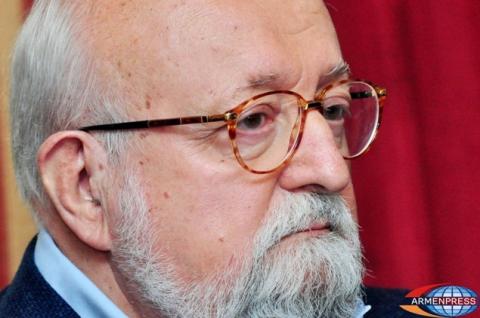Krzysztof Penderecki applauds standing State Youth Orchestra of Armenia
7 minute read

YEREVAN, JANUARY 13, ARMENPRESS. The series of events entitled “Days of Krzysztof Pendereckiin Armenia” commenced solemnly in “Aram Khachaturian” concert hall with the joint performance of State Youth Orchestra of Armenia and cellist Bartosz Koziak on January 13. The minister of Culture of the Republic of Armenia Hasmik Poghosyan, Krzysztof Pendereckiwith accompaniment of his wife Elżbieta Penderecka attended the festive evening.
“Yerevan perspectives” begins its 15th anniversary festive year with the days of the great composer of our times Penderecki. The series of “Pendereckidays” already traditional is held for the third time this year,” the leader of “Yerevan perspectives” festival Stepan Rostomyan stated as reported by “Armenpress”. By the offer of Rostomyan the audience congratulated the birth anniversary of the great maestro standing up.
Krzysztof Eugeniusz Penderecki is aPolish composer and conductor.The Guardianhas called him Poland's greatest living composer.Among his best known works are hisThrenody to the Victims of Hiroshima,St. Luke Passion,Polish Requiem,Anaklasis, four operas, eight symphonies and other orchestral pieces, a variety of instrumental concertos, choral settings of mainly religious texts, as well as chamber and instrumental works.
Born inDębicato a lawyer, Penderecki studied music atJagiellonian Universityand theAcademy of Music in Kraków. After graduating from the Academy of Music, Penderecki became a teacher at the academy and he began his career as a composer in 1959 during theWarsaw Autumnfestival. HisThrenody to the Victims of Hiroshimaforstring orchestraand the choral workSt. Luke Passion, have received popular acclaim. His first opera,The Devils of Loudun, was not immediately successful. Beginning in the mid-1970s, Penderecki's composing style changed, with his first violin concerto focusing on thesemitoneand thetritone. His choral workPolish Requiemwas written in the 1980s, with Penderecki expanding it in 1993 and 2005.
During his life, Penderecki has won several prestigious awards, including the Commander's Cross in 1964, thePrix Italiain 1967 and 1968, the Knight's Cross of theOrder of Polonia Restitutain 1964, threeGrammy Awardsin 1987, 1998 and 2001, and theUniversity of LouisvilleGrawemeyer Award for Music Composition in 1992.[
Around the mid-1970s, while he was a professor at theYale School of Music, Penderecki's style began to change. TheViolin ConcertoNo. 1 largely leaves behind the dense tone clusters with which he had been associated, and instead focuses on twomelodicintervals: thesemitoneand thetritone. Some commentatorscompared this new direction toAnton Bruckner. This direction continued with the Symphony No. 2,Christmas(1980), which is harmonically and melodically quite straightforward. It makes frequent use of the tune of theChristmas carolSilent Night.
Penderecki explained this shift by stating that he had come to feel that the experimentation of the avant-garde had gone too far from the expressive, non-formal qualities of Western music: 'The avant-garde gave one an illusion of universalism. The musical world ofStockhausen,Nono, Boulez and Cage was for us, the young – hemmed in by the aesthetics of socialist realism, then the official canon in our country – a liberation...I was quick to realise however, that this novelty, this experimentation and formal speculation, is more destructive than constructive; I realised the Utopian quality of its Promethean tone'. Penderecki concluded that he was 'saved from the avant-garde snare of formalism by a return to tradition'.
In 1980, Penderecki was commissioned bySolidarityto compose a piece to accompany the unveiling of a statue at theGdańskshipyards to commemorate those killed in anti-government riots there in 1970. Penderecki responded withLacrimosa, which he later expanded into one of the best known works of his later period, thePolish Requiem(1980–84, 1993, 2005). Again the harmonies are rich, although there are moments which recall his work in the 1960s. In recent years, he has tended towards more traditionally conceived tonal constructs, as heard in works such as theCello ConcertoNo. 2 and theCredo. He conductedCredoon the occasion of the 70th birthday ofHelmuth Rilling, 29 May 2003.In celebration of his 75th birthday he conducted three of his works at theRheingau Musik Festivalin 2008, among them Ciaccona from thePolish Requiem.[
In 2001, Penderecki'sCredoreceived theGrammy Award for best choral performance for the world-premiere recording made by theOregon Bach Festival, which commissioned the piece. The same year, Penderecki was awarded with thePrince of Asturias Prizein Spain, one of the highest honours given in Spain to individuals, entities, organizations or others from around the world who make notable achievements in the sciences, arts, humanities, or public affairs. Invited byWalter Fink, he was the eleventh composer featured in the annualKomponistenporträtof the Rheingau Musik Festival in 2001. Penderecki received an honorary doctorate from theSeoul National University, Korea in 2005, as well as from theUniversity of Münster, Germany in 2006. His notable students includeChester BiscardiandWalter Mays.
Penderecki has three children, a daughter from his first marriage, and a son and daughter with his current wife, Elżbieta Solecka, whom he married in 1965. He lives in the Kraków suburb ofWola Justowska. He is working on an opera based onPhèdre byRacinefor 2014 and wishes to write a 9th symphony.